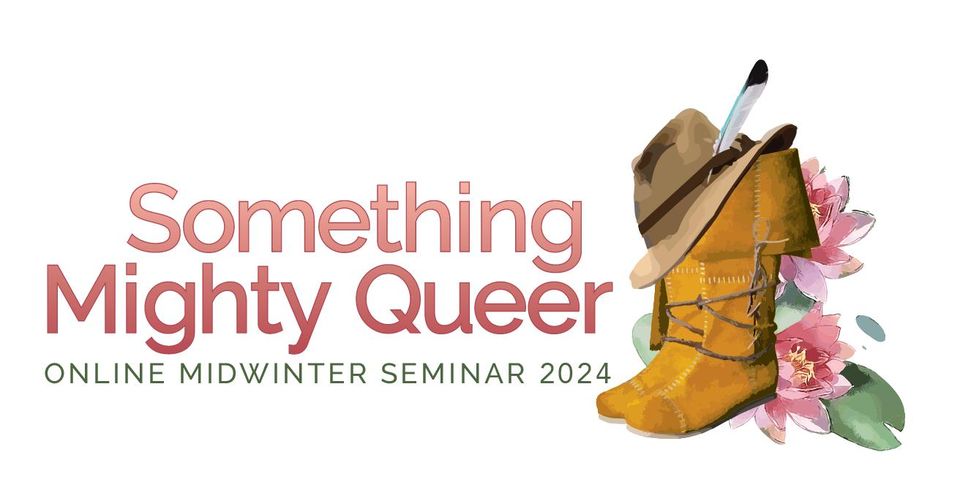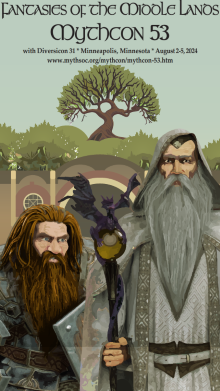Loading...
Event Website
https://www.mythsoc.org/oms/oms-2024.htm
Start Date
2-18-2024 11:00 AM
End Date
2-18-2024 11:50 AM
Description
In Queering Faith in Fantasy Literature (2022), I argue that fantasy affords sexually marginalized people the ability to re-vision Christian theology in queer ways, thanks to its fixation on strange bodies, its longing for other worlds, and the ways in which both of these may reflect back on theological narratives of incarnation and salvation. Yet this project raises further questions that remain unresolved: namely, how might the framework of Christian theology constrain, as well as illuminate, queer imaginaries? If fantasy allows us to envision livable lives for ourselves as unruly bodies, just what forms of relating may those lives entail? Fantasy may, as Jes Battis (2007) has argued, serve as a magical conduit for channeling melancholic desires into action in our world, but what drives the desire for religious belonging? What other desires—sexual, national, racial—might be bound up with it, and what sort of spell are we casting from it?
In this talk, I build on José Esteban Muñoz’s (2009) notion of ‘cruising utopia’ to reaffirm that, rather than merely representing or validating existing LGBTQ+ identities, fantasy’s worldmaking impulse can help us map the conditions for queer ways of life yet to be realized. Yet, following precedents set by George MacDonald and J.R.R. Tolkien, I also deviate from Muñoz’s utopian vision to posit fantasy as an ambivalent third space where queer desires can be both celebrated and interrogated. In this analysis, both fantasy and queerness are profoundly formed by dominant, primary-world cultures even as they attempt to look beyond them. With reference to fantasy works by Chaz Brenchley, Laurie J. Marks, Samuel R. Delany, and others, I suggest that fantasy can map relations between religious devotion, queer desire, and sexually dissident lives that complicate the liberatory frame presented in Queering Faith while continuing to affirm the act of imagining otherwise as the beginning—though crucially far from the end—of queer resistance to a hostile world.
Creative Commons License

This work is licensed under a Creative Commons Attribution-NonCommercial-No Derivative Works 4.0 International License.
Included in
Children's and Young Adult Literature Commons, Comparative Literature Commons, Digital Humanities Commons, European Languages and Societies Commons, Literature in English, Anglophone outside British Isles and North America Commons, Literature in English, British Isles Commons, Literature in English, North America, Ethnic and Cultural Minority Commons, Medieval Studies Commons, Modern Languages Commons, Modern Literature Commons, Other English Language and Literature Commons
Keynote with Taylor Driggers - Cruising Faërie: Further Notes on Queering Faith in Fantasy Literature
In Queering Faith in Fantasy Literature (2022), I argue that fantasy affords sexually marginalized people the ability to re-vision Christian theology in queer ways, thanks to its fixation on strange bodies, its longing for other worlds, and the ways in which both of these may reflect back on theological narratives of incarnation and salvation. Yet this project raises further questions that remain unresolved: namely, how might the framework of Christian theology constrain, as well as illuminate, queer imaginaries? If fantasy allows us to envision livable lives for ourselves as unruly bodies, just what forms of relating may those lives entail? Fantasy may, as Jes Battis (2007) has argued, serve as a magical conduit for channeling melancholic desires into action in our world, but what drives the desire for religious belonging? What other desires—sexual, national, racial—might be bound up with it, and what sort of spell are we casting from it?
In this talk, I build on José Esteban Muñoz’s (2009) notion of ‘cruising utopia’ to reaffirm that, rather than merely representing or validating existing LGBTQ+ identities, fantasy’s worldmaking impulse can help us map the conditions for queer ways of life yet to be realized. Yet, following precedents set by George MacDonald and J.R.R. Tolkien, I also deviate from Muñoz’s utopian vision to posit fantasy as an ambivalent third space where queer desires can be both celebrated and interrogated. In this analysis, both fantasy and queerness are profoundly formed by dominant, primary-world cultures even as they attempt to look beyond them. With reference to fantasy works by Chaz Brenchley, Laurie J. Marks, Samuel R. Delany, and others, I suggest that fantasy can map relations between religious devotion, queer desire, and sexually dissident lives that complicate the liberatory frame presented in Queering Faith while continuing to affirm the act of imagining otherwise as the beginning—though crucially far from the end—of queer resistance to a hostile world.



Comments
Warning: Some Content May Be Inappropriate for Minors.